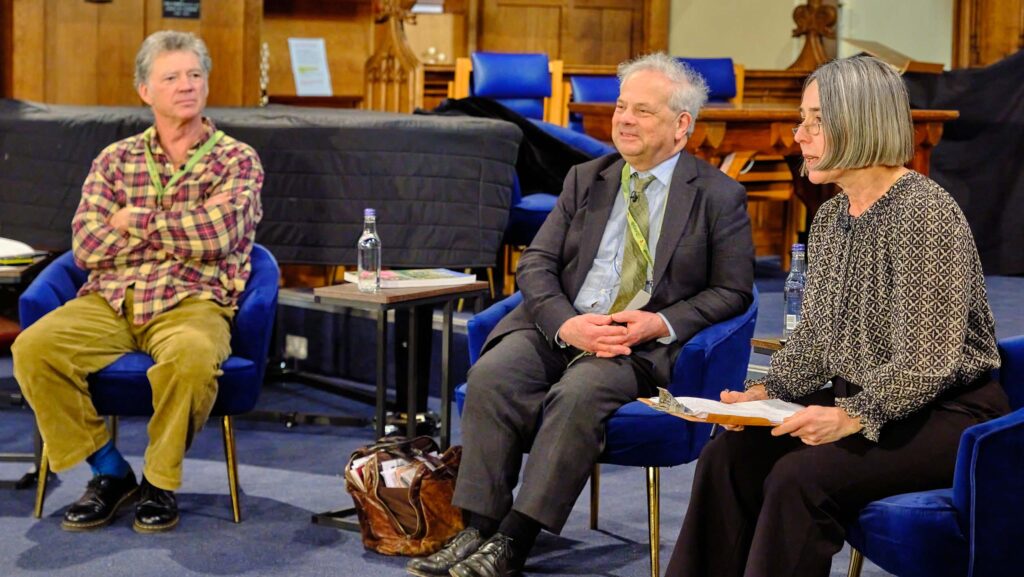ORFC 2025: Farmers urged to keep up pressure on IHT
 Guy Singh-Watson (left) and Jeremy Moody © Hugh Warwick
Guy Singh-Watson (left) and Jeremy Moody © Hugh Warwick Securing any change to the government’s plans to impose inheritance tax (IHT) on agricultural assets will be hard to achieve, but farmers should not give up the fight, says Central Association of Agricultural Valuers’ secretary Jeremy Moody.
Addressing a forum at this week’s Oxford Real Farming Conference, Mr Moody said a change of tack was possible, but achieving it would be hard won.
See also: Oxford protesters stand up against IHT policies
“Civil servants are listening and we have continuing conversations with Treasury and Defra officials,” he said.
There had also been past examples of governments changing their Budget announcements, such as previous Conservative chancellor George Osborne with his infamous “pasty tax”.
“But we’re obviously not looking at any early reversal,” said Mr Moody. “This is the first Budget for this new government – it defines the government, it sets its stall out by it.”
Suspended
Mr Moody added that any sympathetic Labour MPs would still be wary of challenging the current Labour leadership, recalling that, when seven MPs voted against the government’s plan to amend the two-child benefit cap, they had been suspended from the party.
But Mr Moody insisted that the Treasury briefing paper, issued at the time of the Autumn Budget, was “not the end of the game”.
A consultation on how the IHT plans relate to trusts is imminent, and the actual draft legislation will not be issued until July.
While proposed changes to agricultural property relief were just a small part of the chancellor’s fiscal plans, the arguments coming from the farming sector were forceful, and should continue.
‘Talking tosh’
Founder of Riverford Organics, Guy Singh-Watson, took a different view, suggesting farmers were “talking tosh” about the likely impact of IHT on the sector.
“To rebuild our country we need cash, which should come from those with the most,” he said.
“A farmer with £3m [of assets] is a very wealthy person – probably in the top 5% of people in this country – and they do have options.
“I accept that their ability to earn reasonable returns on their wealth is ridiculously low – and there lies the problem to my mind, not Defra policy.”
Mr Singh-Watson said farmers were not the only ones who were passionate about their businesses.
“There are lots of other family businesses that are just as impassioned, yet they don’t get to pass their assets on without paying IHT.
“So I do have some issues with this call for exceptionalism, as if they are the only people in this country who are suffering,” he said.
Mr Moody was quick to point out, however, that as well as cuts to agricultural property relief, all businesses would suffer from the planned reductions in business property relief – the farming community had simply been the quickest to react.
Land values won’t change
Any hope that land prices might slide if farmers are forced to sell in order to meet future inheritance tax (IHT) dues are unfounded, Jeremy Moody told the forum.
Competition for land would still be intense, he suggested, with neighbouring farmers keen to get hold of land that rarely came to market, and other so-called “amenity” buyers looking to purchase blocks of land, perhaps to convert to pony paddocks, to use for environmental projects, or to rent back to farmers.
“There may be areas, for example in Scotland, where the only other buyers will be other farmers – and if that market is starved of liquidity, then that may be an area where prices do move,” he said.
“But for the UK as a whole, land values won’t move. Generally, the appetites people have to buy land are different to those that motivate pure farming.”
